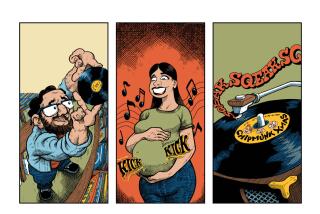‘Lion’ Leads Surge in Album Sales
- Share via
“The Lion King” soundtrack reigned over the 1994 sales race in a year in which U.S.record revenues jumped 11% to an estimated $11 billion--even though profits for retailers shrunk because of cut-throat competition.
“The record industry is on a superior roll, and it doesn’t take a rocket scientist to figure out why,” said SoundScan CEO Mike Shalett, whose New York firm monitors sales for Billboard magazine’s national pop chart. “You couldn’t ask for a bigger smorgasbord of first-rate rock, country, R&B;, rap and pop than what’s available for consumers these days.”
While Garth Brooks’ “Hits” album dominated sales during the final weeks of the holiday season, “The Lion King” was the year’s top seller, racking up more than 4,904,000 units sold and almost $60 million in receipts since its release last spring.
According to SoundScan, the best-selling albums of 1994 after “Lion King” were: Ace of Base’s “The Sign,” 4.9 million; Boyz II Men’s “II,” 4.2 million; Counting Crows’ “August & Everything After,” 3.8 million; Green Day’s “Dookie,” 3.3 million; Tim McGraw’s “Not a Minute Too Soon,” 3.2 million; Stone Temple Pilot’s “Purple,” 3 million; Kenny G’s “Miracles,” 2.96 million; Offspring’s “Smash,” 2.94 million, and Mariah Carey’s “Music Box,” 2.6 million.
Consumers purchased almost 142 million albums over the six-week holiday stretch ending Jan. 1--almost 6% higher than the number sold during the same period last year. The late sales push was boosted by a series of red-hot, year-end releases, including the Brooks album (1.9 million copies in just three weeks in the stores) and Pearl Jam’s “Vitalogy” (2.5 million in four weeks).
The Warner Music Group--which includes the Warner Bros., Atlantic and Elektra labels--continued to dominate the market, accounting for 21.1% of albums sold last year in the United States. The other record conglomerates ranked in order: Sony Music with 15.2%; Bertelsmann Music Group, 12.9%; PolyGram Group, 12.89%; CEMA, 11.23%; and UNI, 10.7%. Independent companies accounted for 15.99%. American record retailers sold more than 615 million albums during 1994, according to SoundScan.
Offspring’s triple-platinum breakthrough offers proof, however, that a feisty independent record label, such as the Southern California group’s Epitaph Records, can still compete in a business run primarily by multinational conglomerates.
Other surprises on the year’s Top 40 list include hits from the Benedictine Monks, Sheryl Crow, Warren G as well as soundtrack smashes from “Forrest Gump” and “Above the Rim.” In addition, ‘90s arrivals such as Pearl Jam, Nirvana and Snoop Doggy Dogg continue to outsell such established superstars as Madonna, Prince and the Rolling Stones.
Jay Berman, chairman of the Washington-based Recording Industry Assn. of America, anticipates global sales to swell 8% to about $32 billion.
While record store owners were pleased about the sales upswing in 1994, many voiced concern about the growing threat of price slashing from discount houses such as Best Buy and Circuit City, which often sell Top 40 compact discs below cost--sometimes as low as $8.88.
(Record manufacturers charge retailers approximately $10.70 per compact disc for top music acts and suggest they sell them for $17.98.)
“Unfortunately, there are a number of new competitors who use music merely as a promotional item to lure consumers in to buy other products--and I’m afraid this trend could lead the industry down a path toward profitless prosperity,” said Mike Greene, vice president and general merchandise manager of the 530-outlet, Fort Lauderdale, Fla.-based Blockbuster Music chain.
“It doesn’t matter how many millions of compact discs move out the door, how long can somebody stay in business if they sell a product for less than they pay for it?”
A survey conducted by Studio City-based Macey Lipman Marketing revealed that hundreds of retailers believe that Best Buy and other mass merchants are not only eroding their profits, but may also be destroying the perceived value of the compact disc.
Consumers took advantage of plunging compact disc prices, purchasing more than 370 million albums in the format--up 7% from last year. Retailers reported a significant drop in the sale of cassette albums, erosion in the market for CD and cassette singles, vinyl albums as well as the mini-disc format.
Retailers say they are looking forward to new releases from Michael Jackson, Van Halen and a new album from Garth Brooks.
“Although record store owners are angry about having to compete with discount houses that sell CDs below cost, they are not about to give up,” said marketing specialist Lipman. “The future still holds a great deal of promise for those merchants who are willing to develop sharper marketing techniques and create an atmosphere to attract music lovers into their stores.”
More to Read
The biggest entertainment stories
Get our big stories about Hollywood, film, television, music, arts, culture and more right in your inbox as soon as they publish.
You may occasionally receive promotional content from the Los Angeles Times.










